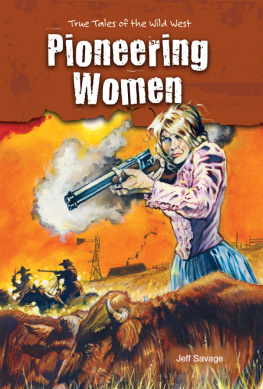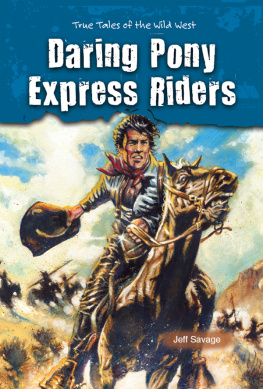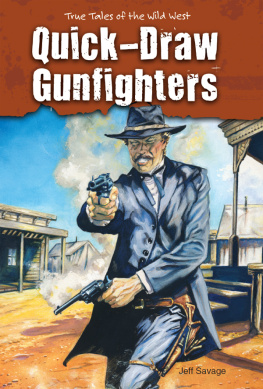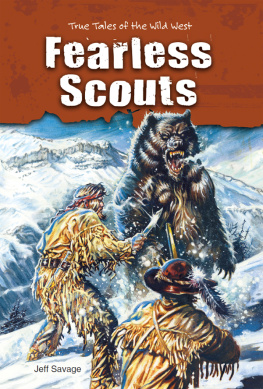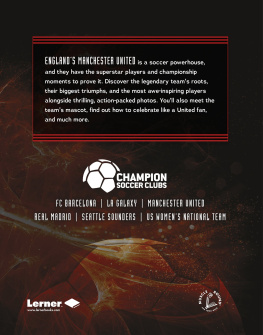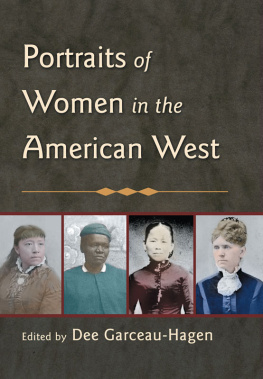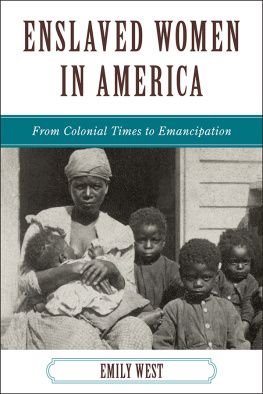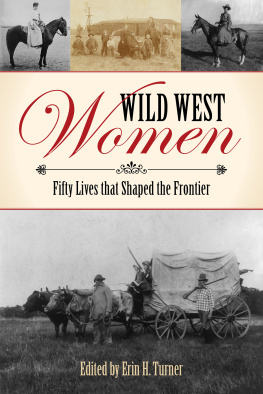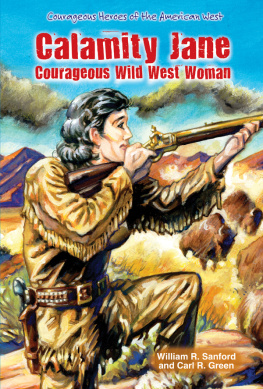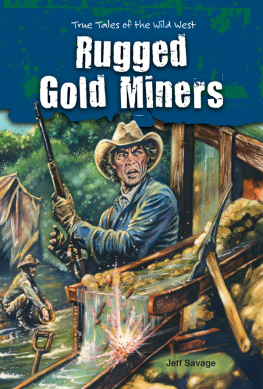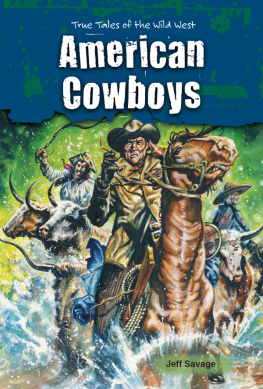"A SIX-SHOOTER MAKES MEN AND WOMEN EQUAL"
Agnes Morley not only coined this phrase, but also backed it up by carrying a gun. While most women in the Wild West did not carry a gun, Morley's quote represented the brave spirit of all pioneering women. As Americans settled the West, women took on important roles as ranchers, teachers, homesteaders, miners, outlaws, and reformers. From Sacagawea to Calamity Jane, author Jeff Savage examines the amazing women pioneers of the Wild West.
About the Author
Jeff Savage has written more than two hundred books for students. Jeff lives with his wife, Nancy, and sons, Taylor and Bailey, in El Dorado Hills, a stone's throw from where gold was discovered in California.

Agnes Morley stared out the window. She watched the sheriffs deputy and some other men in the corral. They were rounding up several cattle to be taken away. Agnes was angry with the men for taking her cattle. But there was nothing she could do to stop it.
Agnes lived with her mother, sister, and brother. When her father died a few years earlier, in 1886, the rest of the Morleys moved to a ranch in New Mexico, high in the Datil Mountains. They became cattle ranchers.
Agnes learned the ways of ranching before she was a teenager. She learned about different breeds of cattle, and she worked at herding. She even learned to beat rustlers, or cattle thieves, at their own game. When the cattle thieves stole some cattle, she and her brother would follow the rustlers, wait for a chance, and steal them right back. Because of her life on the ranch, Agnes became an expert horse rider.
On this day, the Morley family owed money. It was common for ranchers to be in debt sometimes. Instead of letting them pay what they owed when they sold some cattle, the sheriff demanded payment right away. He declared that the Morleys would have to give up some of their cattle to sell at auction. The sheriff sent his deputy and some cowhands to the family ranch to seize the cattle. The sheriff promised to leave the Morleys horses alone. They would take only cattle.
Agnes watched as the deputy finished up in the corral. She never had cared much for the deputy. She thought he was dishonest and cruel to animals.
Suddenly, the deputy ran into the barn. In the next moment, he reappeared with her horse. He led it by the reins out to the main road where the cowhands were waiting with the cattle. The deputy was taking away her horse. The way Agnes figured it, he was stealing it!
Agnes wasnt about to let the deputy steal her horse. She raced to the barn, mounted another horse, and galloped off after him.
Agnes spotted the deputy standing on the road with several cowboys. Then she saw her horse. Agnes rode up to the deputy and demanded her horse returned. The deputy refused. Agnes went after her horse anyway. She jumped to the ground in a somersault, then ran to her horse. When the deputy tried to stop her, Agnes picked up a strap with a heavy bell on the end. She warned the deputy not to interfere. One step closer, she yelled, and Ill brain you with this bell!
The deputy backed away. Agnes rode off on her own horse, leading the other one. The cowboys who were with the deputy later told Agnes that they had been ready to come to her defense. They even said they would have used their guns. As it turned out, Agnes didnt need any help.
Most women were highly appreciated in the early days of the West. This is partly because there were not many of them. In 1849, for example, fewer than five thousand women were among the fifty thousand people who traveled west. Women were precious because they were scarce.
Even ruthless gunslingers were kind to most pioneer women. Agnes experienced this one night when she was out riding alone. An outlaw on the run, in need of a good horse, approached her on the trail. Good evening, Miss, he said politely as he passed her. A short time later, the sheriff caught that outlaw in the act of stealing a horse from a corral and killed him. The outlaw could have stolen Agness horse. He even could have killed her and taken it. Instead, the outlaw respected her. It cost him his life.
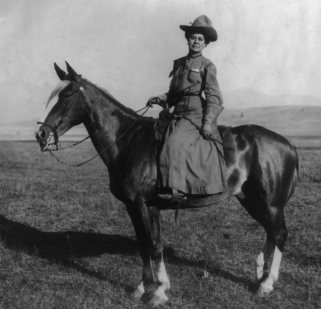
Image Credit: Library of Congress Prints and Photographs
Agnes Morley embodied the brave spirit of Western women. When a deputy stole her horse, she chased him down and took it back. She carried a gun and dressed in a fashion typically worn by men. This portrait shows a woman in cowgirl attire atop her horse.
Agnes began carrying a gun. She called it her equalizer. It had been rare for women in the West to carry weapons, but they did not like to be viewed as helpless. Agnes later wrote a book about her life. In it, she said, A six-shooter does give one a sense of security. We had a saying, A six-shooter makes all men equal. I amended it to, A six-shooter makes men and women equal.
As she grew older, Agnes Morely continued to help her mother run the cattle operation. She enjoyed her freedom to roam the range. She felt sorry for the women who were confined by their husbands. Most women did not get the chance to be cattle ranchers. It was considered mans work.
Agnes knew that this sort of treatment wasnt fair, so she rebelled. First, she refused to wear a sunbonnet. Instead, she wore a five-gallon Stetson cowboy hat. Men were surprised at her boldness, and many respected her even more. Next, she wore a blue flannel shirt and blue denim pants. She completed her outfit with fancy cowboy boots. Finally, instead of riding sidesaddle, as was the custom for women, Agnes began riding her horse astride with her feet in the stirrups.
Agnes Morley was admired by many people who knew her. She was strong, outspoken, and confident. In a way, she blazed her own trail on the frontier. As a woman who made a difference, however, she was not alone in the West.
Many hardships were faced as people settled the western United States in the mid- to late 1800s. The vast wilderness teemed with unknown dangers. There was always a threat of death by thirst, hunger, freezing, animal attack, and a dozen other terrors. American Indians who tried to protect their land against the settlers posed another danger.
Many women came in from the East with their families to meet the challenges of the West. Other women traveled west to make their own way. They found opportunities as enormous as the land itself. They traveled by covered wagon, by horse, and on foot. They rounded up or rustled cattle, robbed banks, panned for gold, taught school, hunted for food, died in gun battles, and demanded law and order. And they endured as best they could.

Image Credit: Enslow Publishers, Inc.
Many women traveled the difficult overland trails to the West. The journey was harsh, and women often had to carry their children. This map shows some of the important trails that the pioneers used to travel west.
In 1876, an American Indian woman named Susette La Flesche, or Bright Eyes, wrote for her father, the chief of the tribe: Look ahead and you will see nothing but the white man, the future is full of the white man, and we shall be as nothing before him.
For thousands of years, people have lived west of the Mississippi River in what is now the western United States. Scientists believe that the American Indians originated in northern Asia. They probably first crossed over the Bering Strait from Siberia to Alaska about 13,000 years ago. It is believed that at that time, a land bridge there connected Asia and North America.

